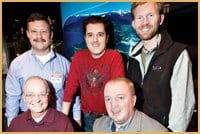With less than two weeks to go before Christmas, more than 30 people gathered in a downtown Vancouver hotel meeting room Dec 14 to hear a presentation from a group that is rallying support for a bid to host the 2011 North American Outgames.
The Outgames is a multisport event that is organized by the Gay and Lesbian International Sport Association (GLISA). The first World Outgames was held in Montreal in 2006, and the first continental Outgames, a regional version of the World Outgames was held in Calgary in 2007.
“Tonight was intended to give people a sense of what might happen in 2011, if there is enough support,” says Greg Larocque, chair of the Vancouver 2011 steering committee. “If there’s not enough support from the celebration community, the human rights community, or the sports community, we won’t go forward.”
Every Outgames features sporting events, a human rights conference and a cultural celebration. Larocque explains that a unique component of his committee’s plan is to showcase Vancouver’s varied geography by arranging sports on land like soccer and dance, at sea like sailing and dragon boating and in the mountains like trekking and biking.
“Tonight was the baby getting born,” he states. “This is the first time the family has seen it — the GLBT family, their friends and supporters.”
A Masters runner himself, Larocque is a founder of GLISA North America, and also serves on the GLISA board of directors as its director of international federations. He hopes to build an event that will “be larger than Calgary” — which attracted 750 athletes and 3,700 visitors — but admits the committee does not have any money yet.
To be eligible to host the games, the committee must submit a letter of intent to GLISA before the end of April, and complete its finalized bid by August 2008. Larocque says he does not know what other North American cities are interested in hosting the 2011 Outgames.
The committee is eyeing Jul 28-Aug 1, 2011 for Vancouver to host the Outgames. The timing would coincide with Pride and could capitalize on the momentum from the 2010 Olympics.
“This is early days and we need to find out all that we can about what the steering committee is thinking and what the community can support,” says Jennifer Breakspear, captain of Sisters in Sync, Vancouver’s lesbian dragon boat team.
“As an athlete, it certainly would be really exciting to compete at that level here in front of hometown support,” she notes.
“It sounds like great timing, right after the Olympics. The city would probably still be in a sports mode,” she continues. “Or is it too soon after and there would be an Olympic fatigue?” she asks. “Those are some of the questions the committee needs to suss out.”
Trevor Fraser, chair of the Vancouver Gay Volleyball Association, found the discussion “very practical. That’s what you need. Everybody was very realistic.”
“It was a very good first step,” concurs Angus Praught, president of gayvan.com Travel Marketing. “I thought it was a very good crosssection of the community. There [were] business interests, sports teams’ interest, people from some of the Pride events, and other tourist organizations as well.”
However, “there’s a lot of work to do still,” Praught says. “Is it financially feasible? Is there community support? Do we have business support? It’s a very early stage right now.”
Praught was the first to ask about the financial troubles of the Montreal Outgames at the meeting. Will “information [be] available for Vancouver to look at to determine if [it] is going to hamper our bid?” he asked.
Montreal’s deficit has been reported at $2.4 million, but Larocque contends that it is closer to $1 million.
“There’s a risk there,” Larocque concedes, “which is why the financial governance has to be very, very strong. I’m sure we’ll be making choices that are more financial based as opposed to sports based. That has to happen because you don’t want the event to be tainted after the fact by this anomaly.”
“I’d want to know more about what happened in Montreal,” Breakspear admits. “It sounded like a very wonderful experience, and the athletes loved it. It was very exciting, and for some people a peak sport experience. I’d like to know about the finances, what it did to the queer sporting organizations in that city, and how they have benefited, or suffered as a result.”
Fraser isn’t concerned. “To me that’s not a worry; that’s a Montreal thing. I really don’t think that’s a problem. [It] comes down to the organizing committee, the size and the practicality of the event.”
“You look at these events as separate autonomous situations,” he explains. “Calgary was in the black. You can run an event how you want and make tough financial decisions. I’m never worried about money things. You can make an event that’s in the black for sure, and we have the best opportunity to do that.”
“I’ve been a participant of Gay Games, [and] Outgames,” Fraser notes. “Being a part of those events is more than just being [in] a sporting event. It is a community event. You have life changing moments when you walk into the stadiums for Opening Ceremonies.”
To learn more about Vancouver’s bid for the 2011 Outgames, contact Greg Larocque at 604. 847.0030, glarocque@shaw.ca, or visit www.vancouver2011.org coming online in January.

 Why you can trust Xtra
Why you can trust Xtra


